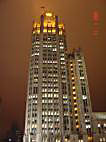
| Big Business |
 |
followthemedia.com - a knowledge base for media professionals |
|
|
AGENDA
|
||
Two Media Giants, One in the US The Other In The UK, Find the Traditional Media Financial Going Tough And The Digital Revenues Can’t Come In Fast Enough To Turn the TideTribune, based in Chicago, announced its Internet traffic increased 28% in April over a year ago but that didn’t stop Moody’s from downgrading its long-term debt rating. In the UK, ITV1 has some of the best kick-off times for the upcoming World Cup and yet its advertising revenue for June and July is forecast to be well below a year ago. It is desperately looking at digital solutions to account for 50% of its total revenue by 2010. The lights burn long into the night at Tribune headquarters in Chicago They’re two very different organizations, but each are media leaders in their own country, and each is having a tough time in the traditional media field. And both see the future in digital. Tribune, heavily into broadcast and newspaper traditional media, currently makes about 6% of its total revenue from the Internet. The company is on record that it wants to double its Internet revenue within three years. The company operates more than 50 web sites and just this week bought the New York-based ForSaleByOwner.com web site that helps property owners sell their homes, bypassing a realtor, and charging far less than a realtor does. The sales price was not announced. Nielsen/NetRatings says that Tribune sites in April had more than 14 million unique users generating 300 million page views. The unique visitors were 28% higher than April, 2005.
But Moody’s has had Tribune on credit watch since mid-March and this week took the expected action of downgrading senior unsecured long-term debt of some $4 billion to the third lowest investment grade (Baa1 from A3). It means the company’s credit is considered a moderate risk edging on the speculative. Moody’s believes the traditional newspaper business will continue to experience further deterioration and even though the company is busily building its Internet business those new revenues still do not replace the revenues being lost by traditional media, including the television properties. Across the pond, Britain’s ITV is experiencing major problems with its lead commercial channel, ITV1. On a recent Saturday evening it managed only a 12 share, the lowest is has ever recorded, although admittedly it was up against what turned out to be one of the most exciting English football cup finals. But its share has been down all year -- it fell from 38.8% to 34.9% for the first four months -- and the advertisers have taken note. The network is now adopting an “out with the old and in the new” programming strategy to get the advertisers back. But it isn’t that simple. Something has fundamentally changed in the UK commercial television scene, and ITV knows it. It shares rights with the BBC for the World Cup football coverage that begins next month. The network had counted on a big positive advertising bonanza – just as a US network showing the Super Bowl expects to make millions on its coverage. Instead the forecasts now indicate advertising income in the June-July period of the tournament actually down some 4% over a year ago with media buyers saying their prime targets are women, not men, and prolonged football coverage turns women away from television. And media buyers are warning that the ITV television spend in July could be down anywhere between 12 – 20% with the whole second half of the year looking pretty awful. The UK television scene has changed so much in recent years. Sky’s satellite services kept adding subscribers – irt now has more than 8 million --, then along came Freeview, the free digital over-the-air service that just needs a set-top box and that’s around another 8 million homes with digital reception meaning that some 16 million households now have a choice of 30 or more channels. The result: With 65% of British households having digital television TV audiences are seriously fragmented. ITV1 now provides about two-thirds of ITVs revenue and management realized some time ago that to grow the business it needed to diversify from that ITV1 dependence. Its target now is to get half of its revenues from outside ITV1 by 2010.
The company is now looking for its digital stations and its ITV Play, an interactive service, to produce some £250 million by the end of 2008. The company is also divesting itself of non-core assets – just this week it sold its 11.6% stake in Australia’s Seven Network for £87 million, and it has an offer on the table for a buy out of its share of Ireland’s TV3. It has so far raised about £400 from sell-offs since it was formed two years ago by the merger of Granada and Carlton. And to top it off, to keep uneasy shareholders happy, the company is in the midst of a £300 million share buyback program. Earlier this year it turned down a bid by Greg Dyke, former BBC director-general, of 130 pence a share. The shares Wednesday closed at 102.50 just off its 52-week low of 100 pence. |
| copyright ©2004-2006 ftm partners, unless otherwise noted | Contact Us • Sponsor ftm |